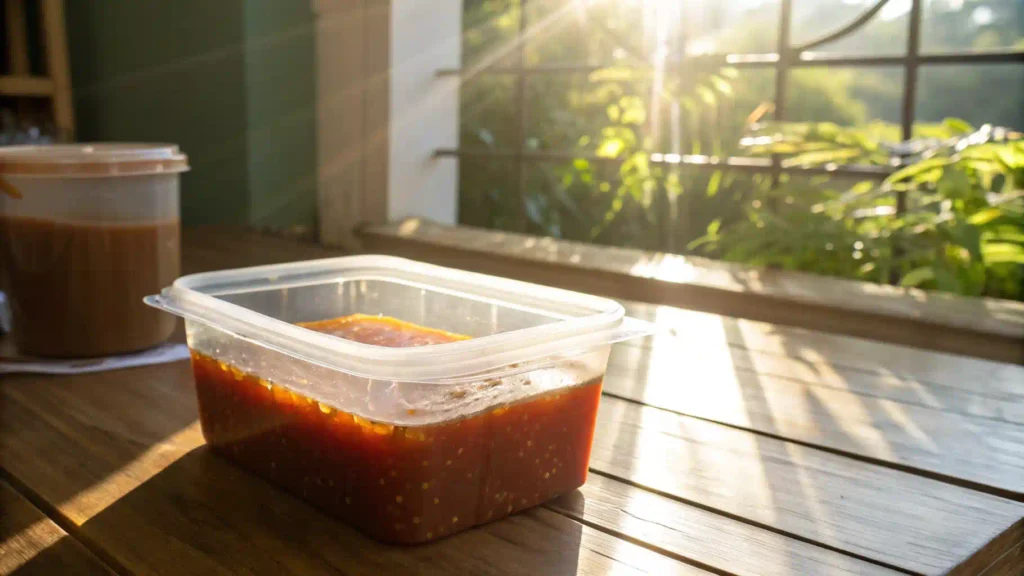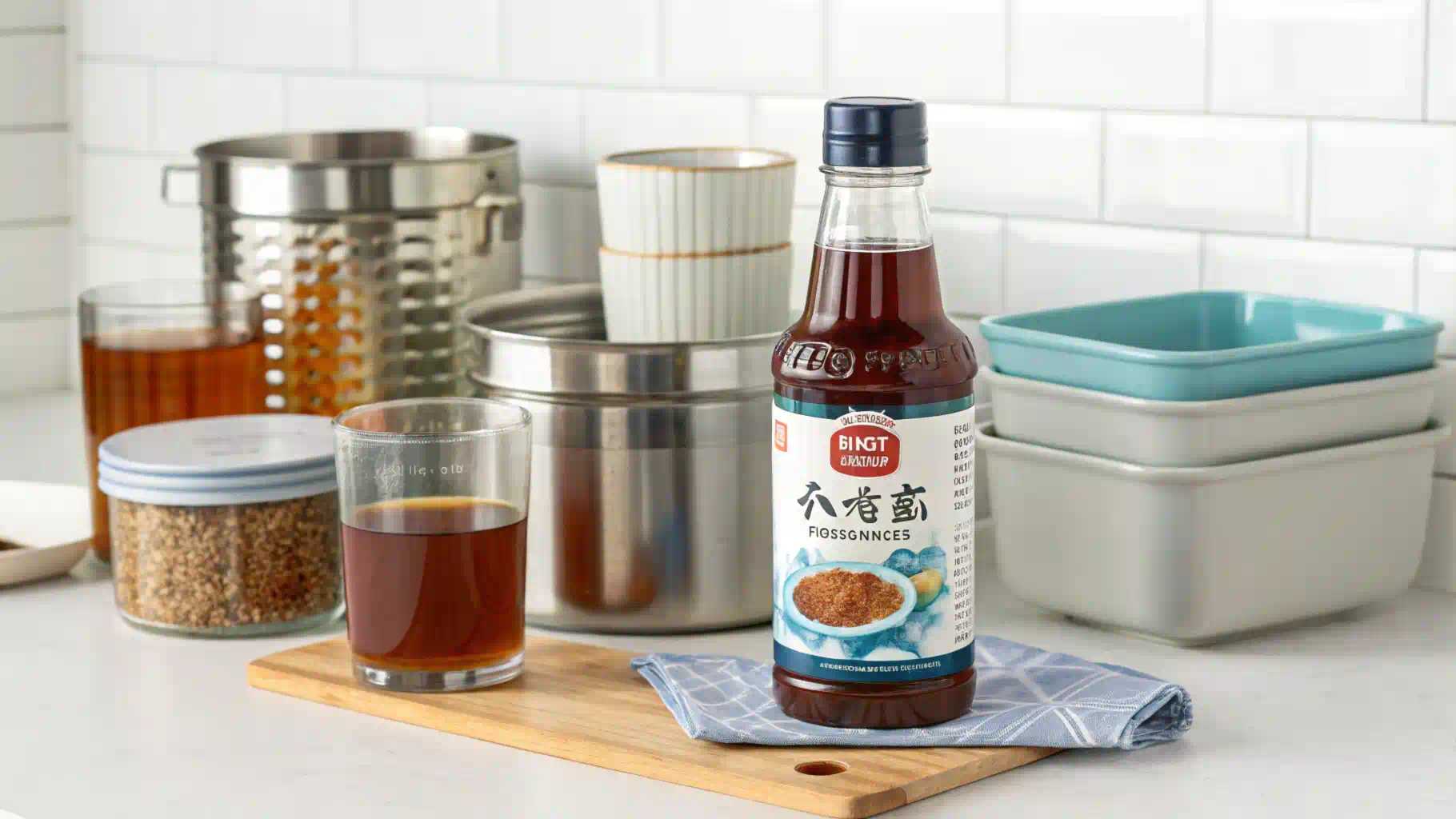Fish sauce is a beloved condiment, but how should fish sauce be stored? This question matters more than you might think. Proper storage is crucial for preserving its bold flavor and ensuring it remains safe to use. From plastic to glass containers, understanding the best practices will help you make informed decisions and avoid common pitfalls.
Table of contents
- Why Proper Storage Matters
- Common Mistakes When Storing Fish Sauce
- Understanding Fish Sauce Properties
- Can You Store Fish Sauce in Plastic Containers?
- Comparing Storage Options: Glass, Metal, and Plastic
- Tips for Storing Fish Sauce Safely
- How to Spot Spoiled Fish Sauce
- Eco-Friendly Alternatives for Storing Fish Sauce
- Frequently Asked Questions
- Conclusion: The Best Practices for Storing Fish Sauce
Proper storage not only preserves the flavor and quality of fish sauce but also ensures it remains safe to consume. Surprisingly, many people overlook this simple yet crucial aspect, leading to unwanted spoilage or a dip in taste. Let’s dive into everything you need to know about storing fish sauce, especially in plastic containers.
“Think of fish sauce as a treasure—it needs the right environment to shine and stay fresh.”
Why Proper Storage Matters
Fish sauce might seem robust, but it’s surprisingly sensitive to its storage conditions. Factors like exposure to light, heat, and air can degrade its quality over time.
Poor storage practices can lead to:
- Loss of its signature flavor.
- Altered color, turning it darker and less appetizing.
- Potential contamination, making it unsafe to use.
Knowing how to store fish sauce isn’t just about extending its shelf life; it’s also about keeping its distinct taste intact.
Common Mistakes When Storing Fish Sauce
Many people unknowingly make mistakes that can ruin their fish sauce. Here are a few common ones:
- Leaving it exposed to sunlight: Direct light speeds up oxidation, dulling the sauce’s flavor.
- Using improperly sealed containers: Air exposure can lead to evaporation and contamination.
- Storing near heat sources: High temperatures can alter its taste and consistency.
Avoiding these mistakes is the first step to getting the most out of your fish sauce.
Understanding Fish Sauce Properties
What Makes Fish Sauce Unique?
Fish sauce is made through the fermentation of fish and salt over several months, sometimes even years. This process creates its rich umami flavor and signature aroma. The high salt content acts as a natural preservative, giving it an impressive shelf life compared to other condiments.
“Fish sauce is a blend of simplicity and science—just fish, salt, and time working their magic.”
The Role of Salt and Fermentation
Salt isn’t just a flavor enhancer in fish sauce; it’s a protective shield. It prevents the growth of harmful bacteria, making fish sauce naturally resistant to spoilage. However, this doesn’t mean it’s indestructible. Poor storage can still compromise its taste and quality.
Why Fish Sauce is Sensitive to Storage Conditions
Despite its durability, fish sauce has its vulnerabilities. Its liquid form means it’s prone to evaporation if not sealed properly. Exposure to air and light can trigger oxidation, changing its flavor profile and color.
Understanding these properties is key to storing fish sauce effectively, especially if you’re considering plastic containers.
Can You Store Fish Sauce in Plastic Containers?
Storing fish sauce in plastic containers has its pros and cons. While plastic is convenient and lightweight, it might alter the flavor over time. If you’re interested in ensuring the best results for other ingredients and dishes, check out Fish Paste Secrets: What You Must Know Today!.

Advantages of Plastic Containers
- Lightweight and Convenient:
Plastic is easy to handle and less likely to break compared to glass or ceramic containers. This makes it a popular choice for everyday use. - Cost-Effective:
Plastic containers are more affordable and widely available than alternatives like glass or metal. - Recyclable Options:
Many plastic containers are now recyclable, making them an environmentally friendlier choice when disposed of responsibly.
Disadvantages of Plastic for Storing Fish Sauce
- Risk of Flavor Alteration:
Fish sauce has a strong aroma and flavor that can sometimes interact with the material of plastic containers. This might slightly alter the taste over time. - Potential for Leaching:
Some plastics, especially lower-quality ones, may release chemicals into the sauce when exposed to heat or stored for extended periods. - Less Durable:
Unlike glass or metal, plastic can degrade over time, especially when exposed to UV light or high temperatures.
“Plastic containers might be convenient, but they aren’t always the safest choice for preserving the quality of fish sauce.”
Best Practices for Using Plastic Containers
Plastic containers can work for short-term storage, but the right techniques are essential to maintain quality. To explore similar preservation strategies for seafood-based ingredients, visit Lectin-Free Fish and Chips Recipe: Made Easy and Delicious.
If you choose to store fish sauce in plastic containers, follow these tips to minimize risks:
- Use BPA-Free Plastic: Ensure the container is food-grade and free from harmful chemicals.
- Keep Away from Heat: Store plastic containers in a cool, dark place to prevent leaching or warping.
- Transfer for Long-Term Storage: Consider transferring fish sauce to a glass or metal container if you plan to store it for more than a few weeks.
Comparing Storage Options: Glass, Metal, and Plastic
Understanding which container works best can elevate your storage game. Glass is often preferred for long-term use. For more on creating the perfect balance between utility and flavor, explore White Fish Magic: Recipes That Will Wow Your Family!.
To determine the best storage method, let’s compare the three most common options:
| Container Type | Pros | Cons |
|---|---|---|
| Glass Bottles | Non-reactive, preserves flavor, long-lasting | Breakable, heavier |
| Metal Containers | Durable, blocks light, prevents contamination | Can react with acidic liquids if not lined |
| Plastic | Lightweight, affordable, widely available | Potential leaching, may alter flavor over time |
Glass Bottles: The Preferred Choice
Glass is often considered the gold standard for storing fish sauce. Its non-reactive nature means it won’t interact with the sauce, preserving its original flavor and aroma. Glass bottles are also easy to clean and reuse, making them a sustainable option.
Metal Containers: Are They Safe for Fish Sauce?
Metal containers, particularly those made from stainless steel or lined aluminum, can be an excellent choice. They’re durable and prevent light from penetrating, which helps maintain the quality of the fish sauce. However, unlined metal containers may react with acidic components, so always check for compatibility.
Plastic: Situations Where It Might Be Suitable
Plastic containers are practical for short-term storage or when portability is a priority. For example, if you’re traveling or need a lightweight option for the kitchen, plastic can work well. Just avoid prolonged storage in plastic to maintain the sauce’s quality.
Tips for Storing Fish Sauce Safely
Regardless of the container type, proper storage practices can make all the difference.
Ideal Temperature and Light Conditions
- Keep It Cool: Store fish sauce at room temperature, away from direct sunlight or heat sources.
- Refrigerate After Opening: While not always necessary, refrigeration can help maintain freshness for longer.
How to Avoid Contamination
To answer the question, “How should fish sauce be stored?”, consider these practical tips:
- Always use a clean utensil to scoop fish sauce.
- Avoid pouring unused portions back into the bottle.
- Seal the container tightly after every use.
Extending Shelf Life with Proper Sealing
Proper sealing is crucial for keeping fish sauce fresh and flavorful. Avoid common pitfalls by learning about techniques to enhance ingredient longevity in How to Make Fish Maw Soup Like a Pro.
“A well-sealed container is like a shield, protecting the rich flavors of fish sauce from external elements.”
How to Spot Spoiled Fish Sauce
Even though fish sauce has a long shelf life, improper storage can cause spoilage. Knowing the signs of bad fish sauce ensures you don’t compromise the safety or taste of your dishes.
Signs Your Fish Sauce Has Gone Bad
- Unpleasant Odor:
Fresh fish sauce has a strong yet appealing aroma. If it smells sour or overly pungent, it may have spoiled. - Strange Appearance:
Look for changes in color or consistency. A darker-than-usual color or thick residue at the bottom could indicate spoilage. - Mold or Contamination:
Visible mold on the surface or around the lid is a clear sign the sauce should be discarded.
“Fish sauce should enhance your cooking, not make you second-guess its freshness. When in doubt, toss it out!”
Common Causes of Fish Sauce Spoilage
- Air Exposure: An improperly sealed bottle allows air to oxidize the sauce.
- Contamination: Using dirty utensils can introduce bacteria.
- Improper Storage: Storing in direct sunlight or near heat sources accelerates spoilage.
What to Do If Your Fish Sauce is Spoiled
If you notice any of the signs above, it’s best to discard the sauce. Spoiled fish sauce not only tastes unpleasant but could also harm your health.
Eco-Friendly Alternatives for Storing Fish Sauce
Sustainability matters, even when it comes to condiments. Consider these eco-friendly options for storing fish sauce:
Biodegradable Packaging
Some brands now offer biodegradable packaging for sauces. While not as widely available, these options reduce environmental impact without compromising quality.
Reusable Containers for Sustainability
Invest in reusable containers, such as:
- Glass Jars or Bottles: Durable, non-reactive, and easy to clean.
- Stainless Steel Containers: Ideal for those seeking a durable and light-proof alternative.
“Choosing reusable options isn’t just good for the environment—it’s also a smart way to preserve the quality of your fish sauce.”
Recycling Tips for Fish Sauce Bottles
- Plastic Bottles: Rinse thoroughly before placing them in the recycling bin.
- Glass Bottles: Remove labels and lids, and ensure they’re clean.
- Metal Caps: Most metal caps are recyclable; check your local guidelines.
Frequently Asked Questions
Does Plastic Affect the Flavor of Fish Sauce?
Yes, plastic containers can sometimes alter the flavor, especially if the container is not food-grade or if the sauce is stored for an extended period. High-quality BPA-free plastic reduces this risk but is still less ideal than glass or stainless steel.
Can You Freeze Fish Sauce for Longer Storage?
While it’s not necessary to freeze fish sauce, you can do so to extend its shelf life. Pour the sauce into a freezer-safe container, leaving room for expansion. Note that freezing may slightly alter its consistency.
How Long Can Fish Sauce Be Stored in Plastic?
For short-term use, fish sauce can be stored in plastic for up to a month, provided it’s kept in a cool, dark place. For longer storage, transferring to glass or metal is recommended to preserve quality.
“Think of plastic as a temporary solution and glass or metal as the long-term home for your fish sauce.”
Conclusion: The Best Practices for Storing Fish Sauce
Storing fish sauce correctly isn’t complicated, but it requires a bit of attention to detail. Whether you use plastic, glass, or metal, the key is to minimize exposure to light, heat, and air. By following these tips, you’ll keep your fish sauce fresh, flavorful, and ready to elevate your meals.
Remember, choosing the right container is about more than convenience—it’s about preserving the essence of a beloved culinary staple.
“With proper care, fish sauce will continue to be the secret ingredient that transforms your dishes from ordinary to extraordinary.”

